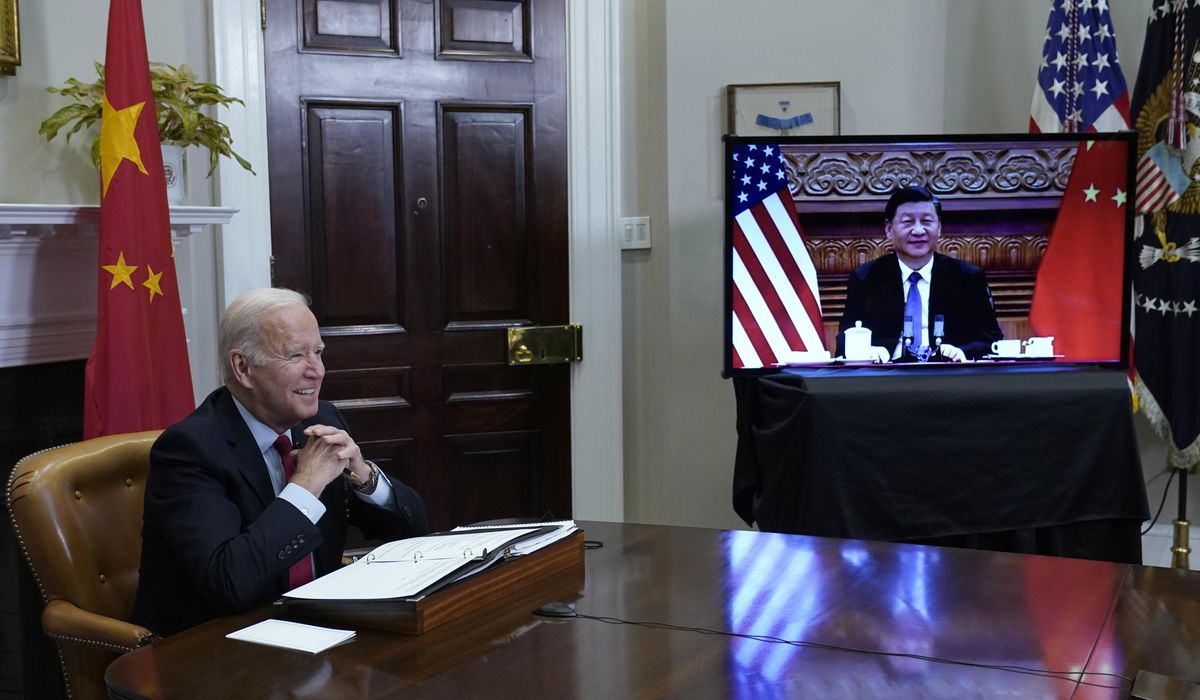
President Biden and Chinese leader Xi Jinping met via video teleconference for more than three hours on Monday night, discussing a wide slate of issues at a moment of growing international concern over Cold War prospects between them.
While China‘s military muscle-flexing and advancements — including its rapidly expanding nuclear arsenal and a recent test of a nuclear-capable hypersonic missile — have made global headlines, a White House summary of Monday night’s call made no mention of a specific discussion on such matters between Mr. Biden and Mr. Xi.
The president did, however, caution the Chinese leader that U.S. officials are uneasy about China‘s growing aggression toward Taiwan. Mr. Biden also raised concerns about Beijing’s mistreatment of Muslims and ethnic minorities in Xinjiang province, and aggressive policies against Hong Kong and Tibet.
Administration officials said in a statement that the president also raised concerns about “human rights more broadly.”
On other fronts, Mr. Biden “was clear about the need to protect American workers and industries from [China‘s] unfair trade and economic practices,” a White House readout of the Biden-Xi conference said. “He also discussed the importance of a free and open Indo-Pacific, and communicated the continued determination of the United States to uphold our commitments in the region.”
“President Biden reiterated the importance of freedom of navigation and safe overflight to the region’s prosperity,” the readout said, adding that “on Taiwan, President Biden underscored that the United States remains committed to the ‘one China‘ policy, guided by the Taiwan Relations Act, the three Joint Communiques … and that the United States strongly opposes unilateral efforts to change the status quo or undermine peace and stability across the Taiwan Strait.”
While Mr. Biden’s comments signal ongoing U.S. support for Taiwan, he also echoed recent statements by Secretary of State Antony Blinken, who asserted that the longstanding “one China” U.S. policy of acknowledging Beijing’s sovereignty over Taiwan has not changed.
Friction between the U.S. and China over Taiwan has been growing, with surging Chinese military incursions into Taiwanese airspace over the past year and reports of American forces training Taiwanese forces.
Chinese officials have signaled desires for China to fully absorb Taiwan, and U.S. officials have warned that Beijing may be moving toward attempting to use force to achieve that end.
During the conference, Mr. Xi took an aggressive posture on the issue. According to China‘s Xinhua News Agency, the Chinese leader blamed the tensions on Taiwan, claiming the island democracy has sought to attain independence from China through reliance on the U.S., and that some on the American side are trying to use Taiwan as a way to interfere in China.
“This is extremely dangerous, it’s playing with fire, and they that play with fire will burn themselves,” Mr. Xi was quoted as saying by the agency.
Away from the Taiwan issue, U.S. military officials have expressed growing concern over China‘s expanding nuclear weapons arsenal. A recent Pentagon report warned that China is on a path to more than doubling its arsenal over the coming years and could have 700 deliverable nuclear warheads by 2027, and 1,000 by 2030.
While there was no specific mention of this in the White House readout of the Biden-Xi conference, the readout said Mr. Biden “underscored the importance of managing strategic risks” with China and “noted the need for common-sense guardrails” to ensure that U.S.-China “competition does not veer into conflict.”
Chinese officials eagerly praised the outcome of the summit, saying on Tuesday that Mr. Biden and Mr. Xi had a candid and constructive exchange that sent a strong signal to the world.
The positive description of the meeting was in sharp contrast to heated exchanges between the two nations earlier this year. The talks appeared to mark what both sides hoped will be a turnaround in relations, though major differences remain.
“If China-U.S. relations cannot return to the past, they should face the future,” Chinese Foreign Ministry spokesperson Zhao Lijian said on Tuesday.
The video conference between the two leaders and their senior aides was their first formal meeting since Mr. Biden took office in January.
Facing domestic pressures at home, both Mr. Biden and Mr. Xi seemed determined to lower the temperature in what for both sides is their most significant — and frequently turbulent — relationship on the global stage.
“As I’ve said before, it seems to me our responsibility as leaders of China and the United States is to ensure that the competition between our countries does not veer into conflict, whether intended or unintended,” Mr. Biden told Mr. Xi at the start of their virtual meeting Monday. “Just simple, straightforward competition.”
The White House had set low expectations for the meeting, and no major announcements or even a joint statement was delivered. Still, White House officials said the two leaders had a substantive exchange.
Mr. Xi greeted the U.S. president as his “old friend” and echoed Mr. Biden’s cordial tone in his own opening remarks, saying, “China and the United States need to increase communication and cooperation.”
• This article is based in part on wire service reports.








